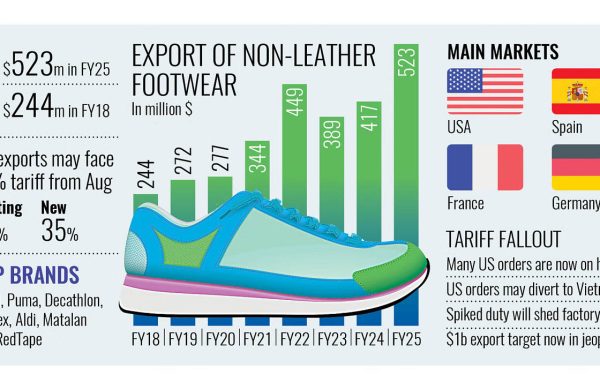A ‘million-dollar’ wedding and the death of an unpaid RMG worker
- Update Time : Monday, November 4, 2024

TDS Desk:
This is a tale of two realities. In one, a “million-dollar” wedding of Bangladeshi businessman Javed Opgenhaffen dazzled Paris last year; in the other, a female worker’s life was cut short in a violent wage protest at Javed’s family-owned garment factory in Bangladesh this year.
In September 2023, Javed married an Indian-origin fashion icon, Rosemin Madhavji, in a lavish wedding in Paris. Photos and videos of the glamorous ceremony went viral on social media.
Touted as one of the most expensive weddings in Paris that year, the event attracted global media attention, with magazines like Vogue and Tatler covering it extensively.
This opulent display of wealth abroad sharply contrasts the harsh reality back home a year later, where thousands of workers at Javed’s family-owned factory, Generation Next Fashions Ltd, are struggling to survive without being paid for months.
Since early September this year, workers at the Ashulia factory have been protesting over unpaid wages, leading to clashes with local law enforcement. The factory was closed on 9 September, but protests for arrears continued.
The factory was permanently closed yesterday. The decision was made at a meeting of company officials, labour leaders, the labour ministry and the BGMEA.
The company must pay up all dues to its workers and employees as per law.
During a clash on 23 October, Champa Khatun, a 25-year-old worker of the factory, was critically injured. After days in the ICU at Dhaka Medical College Hospital, she succumbed to her injuries on 27 October.
Champa’s death is one of three casualties linked to recent labour unrest in Bangladesh’s RMG sector, which has also left dozens injured.
Generation Next is not solely responsible for the unrest affecting the RMG sector, the country’s leading export earner, but it certainly contributed to worsening the unrest.
According to BGMEA sources, by the third week of October, the labour unrest had eased and all factories had reopened except for two, one of which is Generation Next, as it still has not paid due wages.
Besides, its owners are reportedly unreachable. Javed, a former director of the company, and his father, Tauhidul Islam Chaudhury, the company’s current chairman, are believed to be overseas.
Tauhidul Islam Chaudhury, a sponsor director of Generation Next Fashions, holds a 5.13% stake and AJ Corporation, chaired by Tauhidul, owns nearly 7% of the company. Other family members also have stakes in the company, according to the latest report from the Dhaka bourse.
Javed is a shareholder and director in various business ventures in Bangladesh, serving as vice chairman of AJ Corporation, chairman of Fu-Wang Ceramic Industry Ltd and SS Steel, and director of Generation Next Technologies Ltd, according to AJ’s website.
The family operates a diverse portfolio of businesses, including ready-made garments, real estate, steel manufacturing, and more.
‘CLOSE TIES WITH SHEIKH FAMILY’
Javed and his father reportedly went into hiding after 5 August, the day former Bangladesh prime minister Sheikh Hasina’s Awami League was ousted from power.
Javed’s family is reported to have close ties with Sheikh Hasina’s family, particularly through Saida Muna Tasneem – a stakeholder in Generation Next as per the BGMEA database and the second wife of Javed’s father, Tauhidul Islam Chaudhury.
Javed is the son of Tauhidul’s first wife.
Saida Muna Tasneem served as the Bangladesh High Commissioner to the UK from November 2018 until September this year, when the current interim government ordered her to return to Dhaka immediately as part of an ongoing process to recall envoys appointed by the ousted Awami League government.
However, BCS (Foreign Cadre) 11th batch officer Muna, who was scheduled to begin her post-retirement leave on 26 December, has not responded to this directive.
Diplomats typically serve three-year terms at individual missions; however, Muna held her position for nearly six years, mainly due to her close ties with the Sheikh family.
When this correspondent contacted Saida Muna Tasneem via WhatsApp, she declined to comment on the allegation or the reasons for the poor state of Generation Next Fashions.
This correspondent also attempted to contact Tauhidul Islam Chaudhury and his son Javed Opgenhaffen via WhatsApp about the unpaid wages of workers but was unable to establish communication.
WAGE BACKLOG TRIGGERED PROTESTS
According to company officials, Generation Next Fashion faced a growing inability to meet payroll obligations after the July-August political upheaval.
Although it managed to pay only the workers’ salaries in July – excluding the management staff – by August, over 4,700 employees and staff were owed wages, leading to protests.
According to the BGMEA, the salaries owed to only management staff amounted to Tk3 crore in July.
A factory official, speaking anonymously, told this correspondent that salary issues started in April, with the company’s financial strain becoming evident by July when the company cut back on raw materials and other supplies.
“The company owes around Tk21.66 crore to employees, with October wages expected to add at least Tk5 crore more to this debt,” he said.
Despite the arrears, workers continued working, initially raising wage demands internally. However, on 8 September, they began a work abstention in protest, and by 21 September, the protests escalated to roadblocks and clashes occurred with law enforcers, said the official.
Company Secretary Mohammad Shahjahan told this correspondent, “Our main issue is the labour unrest. When workers stopped coming in, we had no choice but to suspend operations.”
When asked about the outstanding wages, he said that the delays were due to difficulties in securing bank loans.
Requesting anonymity, officials from the Registrar of Joint Stock Companies and Firms (RJSC) informed this correspondent that, according to database information, Generation Next Fashions and AJ Corporation have bank liabilities exceeding Tk500 crore.
Shahjahan said a meeting was held with workers on 26 October, where it was decided that salaries would be paid in instalments, with August’s salary due by 5 November.
“The factory will be reopened shortly after salary disbursement,” he said.
“We have always had sufficient work orders, but worker unrest disrupted production, delaying exports and causing orders to be put on hold,” the company secretary added.
SECURITIES LAW VIOLATION
Generation Next Fashions, a publicly listed company, may have violated securities laws by failing to notify the stock exchange of its factory closure on 9 September.
Although the company released its third-quarter FY24 report on 30 April, no information about the factory shutdown has been disclosed on the stock exchange’s website, breaching listing rules.
FALL OF A ONCE-PROFITABLE COMPANY
Established as a private limited company in 2004, Generation Next Fashions Ltd entered the capital market in 2012, raising Tk30 crore through its IPO.
According to the latest report from the Dhaka Stock Exchange, Javed’s family and affiliated companies hold 16.26% of Generation Next’s shares, while general investors own 83.74% (62.39% public and 21.35% institute).
Key shareholders include Javed’s father, Tauhidul Islam Chaudhury, a sponsor director with a 5.13% stake; AJ Corporation with 6.97%; managing director of AJ Corporation Indian national Rajib Sethi with 2%; director Alavee Azfar Chaudhury with 2.12%; and Shaheen Akhter Chaudhury with 0.04%.
Generation Next has been faring well in the past few fiscal years with high demand for its products among global buyers, according to BGMEA sources.
According to its financial reports since fiscal years 2018-19, the company reported solid revenue and profits from garment exports.
It generated Tk518 crore in revenue and Tk21 crore in profit in FY19, Tk292 crore in revenue with a Tk0.33 crore profit in FY21 and Tk596 crore in revenue and Tk3.41 crore in profit in FY23.
However, it posted a Tk1.86 crore loss in the first three quarters (July-March) of FY24, and revenue declined by 41% to Tk291 crore, attributed to rising costs.
Although FY24 concluded in June this year, Generation Next has yet to schedule a board meeting to release its annual financial report and declare dividends.
When asked about the sudden downturn, Shaheen Akhter Chaudhury, a board director of Generation Next representing AJ Corporation, told this correspondent, “Business often can go well, and it can go bad; we’re working to turn things around.”















